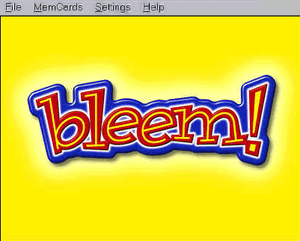Bleem!
|
The interface of the discontinued Bleem! emulator | |
| Developer(s) | Bleem Company |
|---|---|
| Initial release | 1999 |
| Stable release |
1.6b
/ August 16, 2001 |
| Operating system | Microsoft Windows, Dreamcast |
| Type | Emulator |
| License | Proprietary |
| Website | www.bleem.com at the Wayback Machine (archived May 15, 2001)) |
Bleem! (styled as bleem!) was a commercial PlayStation emulator released by the Bleem Company in 1999 for IBM-compatible PCs and Dreamcast. It is notable for being one of the few commercial software emulators to be aggressively marketed during the emulated console's lifetime, and was the center of multiple controversial lawsuits.
History
Bleem! was a PlayStation emulator designed to allow people to play original PlayStation games on their PC or Dreamcast gaming consoles (the Dreamcast version was called Bleem! for Dreamcast). It was released in March 1999. The company that developed and commercialized Bleem! initially consisted of just two people, David Herpolsheimer (president) and Randy Linden,[1] but in the commercial phase included Will Kempe, Scott Karol, Sean Kauppinen, Bryan Stokes, and Paul Chen, later of Rovio Entertainment.
Context
To allow for full-speed emulation of what was at the time a current generation console on even lower-end computers, the authors coded Bleem! in assembly. This allowed them to create precise optimizations.[2] Unlike Connectix's commercial Virtual Game Station, it made use of a PC's 3D graphics hardware for rendering allowing for enhanced resolutions and filtered textures not possible on real hardware. Despite claims of "enhanced" graphics, bugs plagued bleem! as well, with all but one game (One) being plagued by major bugs according to bleem's own compatibility charts.
Bleem! was also released in 3 other versions for the Sega Dreamcast called Bleemcast! to play the popular PlayStation games Gran Turismo 2, Metal Gear Solid and Tekken 3. Bleemcast! was originally planned as a series of "Bleempacks" that would each support about 100 games, but this soon became an impossibility due to the amount of testing required to support such a large library of games, as well as the lack of a possible software update on the Sega Dreamcast platform. Early ads in magazines advertising Bleemcast! claimed that it would bring 400 new games to Dreamcast.
Bleem! used low-level memory emulation and other real-mode technology. It did not function on operating systems using the Windows NT kernel, including Windows 2000. In fact, Bleem!'s statement at the time was that Bleem! would never support running on Windows NT-based systems, as Windows 98 was the dominant operating system at the time.
Sony, despite having lost its case with Connectix, continued to pursue legal action against Bleem!. Bleem!, financially unable to defend itself, was forced to go out of business.
As of 2005, 2 members of the team were working for Sony - Randy Linden was working for SCEA on porting titles and looking at the possibility of emulation of previous generation titles for the next PlayStation, and Sean Kauppinen was promoting EverQuest II and Star Wars Galaxies for Sony Online Entertainment.
Legacy
Although Sony's litigation against Bleem! led the company to bankruptcy, Sony did not manage to win a decisive victory against Bleem! and to have the product removed from shelves after their demise, which is a legal precedent for the commercial viability of emulators invigorating development of many free PlayStation emulators offering 90% or greater compatibility, and with Bleem! generally regarded as obsolete.
Controversy
Copy protection
To combat redistribution of the small downloadable emulator, the user had to buy the Bleem!-CD. A CD containing about 35 MB with a DirectX distributable and the actual version of Bleem! available at the time of the CD's printing. The rest of the CD was only for copy protection and was impossible to copy with conventional means; however the copy protection was cracked nevertheless within two weeks of the release.
Further updates to the emulator were free, until the company ceased operation several years later.
Sony lawsuit
Two days after Bleem! started taking preorders for their emulator, Sony filed suit against them alleging that they were violating their rights and that providing access for PlayStation games to run on non-Sony hardware constituted unfair competition.[3]
Ultimately Bleem! won in court and a protective order was issued to "protect David from Goliath".[1] Sony lost on all counts, including Bleem!'s use of screenshots of PlayStation games on its packaging. The court noted that Bleem!'s use of copyrighted screenshots was considered fair use and should be allowed to continue.
Despite the legal victories, the legal fees allegedly forced the company out of business. eBay auctions of some of the company's possessions were held soon after - including a huge library of worldwide game releases apparently used for compatibility testing.
See also
References
- 1 2 Rhodes, Tom. "Best Little Emulator Ever Made!". Best Little Emulator Ever Made!. Escapist Magazine. Retrieved 2015-01-02.
- ↑ Dragon¥en. "Interview with bleem author". Retrieved 2007-10-03.
- ↑ "Sony Computer v. Bleem, Inc.". Docket Alarm, Inc. Retrieved 29 August 2013.
